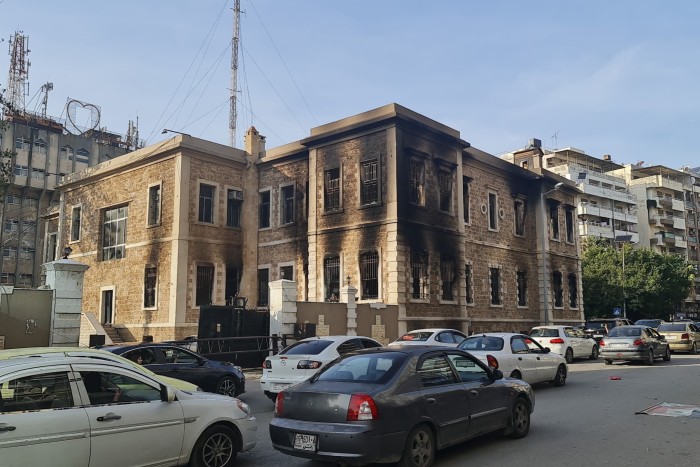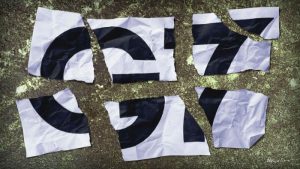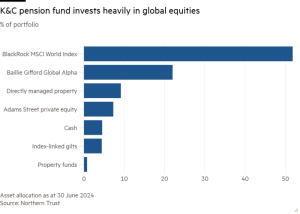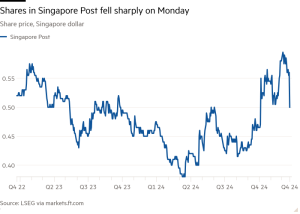The Assads’ Syrian heartland casts them aside

As news of the rebels’ victory in Syria spread at dawn on Sunday, people in seaside towns long known as bastions of loyalty to the Assad regime took to the streets to celebrate.
By the time rebels themselves rolled into the northwestern coastal heartland of Bashar al-Assad after lunchtime, statues of Assad’s father had already been torn down from town squares, said Samer Abbas, a researcher from the countryside near the port city of Tartus.
“I was shocked by how quickly people rose up,” said Abbas, who for more than a decade had worked under a pseudonym, which he hid even from his wife, to avoid being arrested for his anti-regime writing.
“As soon as news came that Bashar al-Assad had left Syria, people started to curse him — and his father, which is deeply symbolic because they used to worship [his father] almost religiously. Suddenly, Alawites were cursing his father!”
Video from #Latakia city with the statue of the late Hafez al-Assad in #Syria pic.twitter.com/jgWX0PV8sc
— Qusay Noor (@QUSAY_NOOR_) December 8, 2024
The Assad regime long drew loyalty from Syria’s coastal region, the birthplace of Bashar’s father Hafez al-Assad. Latakia and Tartus provinces are majority-populated by members of the Alawite sect, an offshoot of Shia Islam, to which the Assads belong. Alawites, one of Syria’s minority communities, have dominated the regime apparatus and security forces since Hafez seized power in a military coup over 50 years ago. Abbas, the researcher, is also Alawite.
As the rebels advanced, led by the Sunni Islamist Hayat Tahrir al-Sham faction, many people loyal to the government fled the cities of Homs and Hama to the coast, believing the area to be more firmly in the regime’s grip.
But despite the Assads’ networks of patronage and cronyism in the region, discontent had run deep by the time of the dictator’s fall. Residents endured worsening poverty and lost large numbers of men fighting for a regime that brutally crushed opposition forces during the devastating civil war.
While former loyalists set fire to regime buildings and changed their Facebook profile pictures to the flag of the Syrian revolution, rebels organised meetings to reassure everyday Alawites they had nothing to fear. For those deemed complicit in Assad’s rule, however, the reckoning was still to come.

From his laboratory in a private hospital across the street from the regime’s Ba’ath party headquarters in the seaside city of Latakia, X-ray technician Alaa watched on Monday as rebel fighters entered the looted building, searching it for weapons left behind by fleeing party officials and their guards.
All around him the old patronage system — in which friends and members of the Assad clan would benefit from contracts, tenders and government positions — was unravelling. The cronies, businesspeople and bureaucrats who had hitched their fates to the ruling family were suddenly nowhere to be seen.
“It was a closed circle,” he said. “The bargain was: authority in exchange for security.”
The region, which is also home to large Sunni and Christian populations, did not see the worst of the fighting during the civil war, but it still bears the scars of the conflict. Alawite residents sent vast numbers of soldiers to fight for the regime, and resentment mounted as they died en masse.
Bitterness grew towards the government “for not giving anyone anything in exchange for what they sacrificed”, said Alex Simon, cofounder of Synaps, a Beirut-based research centre.
The region is also home to Russia’s Syrian bases, used to help prop up the Assad regime in the civil war and to give Moscow a strategic toehold in the southern Mediterranean: its Hmeimim air base is near the city of Latakia and its naval base in Tartus.
Locals said the Assad clan worked like a “mafia” in the coastal region, shaking down businesses for royalties or protection fees. They said Bashar’s wife Asma, a former banker who ran Syria’s secretive economic council, had overseen much of the draining of the region’s financial resources.
“People were getting poorer and we were tired of it all. We paid taxes but they just went into the pockets of the regime. There were no services,” said Alaa.
“Government workers were paid next to nothing so part of the deal was they were owed the right to embezzle. You couldn’t question anyone with links to the regime.”

Alaa used to carry out X-rays for a prominent cousin of Bashar al-Assad. Often, the cousin would not even pay. Now, he said, the cousin had disappeared, likely fleeing along with many other regime cronies to the inland mountain villages that are the historical home of Alawite communities.
On the first day of rebel rule, the widespread celebration was tempered with fear. Alawites took down photos of the Assad family hanging on their walls and hid their religious texts after rumours spread that rebels would search homes, said Abbas.
Mohamad Salah Shalati, a trader and former Sunni sheikh, or religious leader, from Latakia, said that on Sunday morning he was overwhelmed with calls from Alawites and Christians terrified of the fate awaiting them at the hands of Sunni Islamist rebels. Shalati himself was removed from his sheikhdom and briefly imprisoned by the regime during the initial Syrian uprising against the Assads in 2011.
Alawites fear that “they [will] be persecuted as an imputed enemy of the new state,” said Natasha Hall, senior fellow on the Middle East Program at the Center for Strategic and International Studies.
“The Assad regime has stoked sectarianism in the country, especially among the Alawites, in order to maintain their loyalty — to make them believe their existence as a sect in Syria is dependent on the Assad clan’s rule.”
In the chaotic immediate aftermath of the regime’s fall, some score-settling took place, with isolated instances of killing in Latakia and Tartus, according to locals.
But residents that spoke to the Financial Times said they did not know of public executions or official retribution campaigns by the rebels. By Monday, they said, the situation had stabilised.
Shalati said he had reassured the fearful callers who contacted him. He had spoken to multiple rebel leaders in Latakia, he said, and sought guarantees that Alawites and Christians would not face retribution.
In the early years of the civil war, the region was the scene of bloody tit-for-tat sectarian massacres, with regime forces carrying out mass executions in majority-Sunni towns and Islamist rebels slaughtering hundreds in Alawite villages.
During its lightning offensive across the country over the past two weeks, the main rebel faction HTS issued a statement calling on Alawites to “detach” themselves from the regime, and saying there was a place in the revolution for them.
“It’s the regime that divided us,” Shalati said.
Incoming rebel leaders quickly organised meetings with local Sunni, Christian and Alawite religious leaders in multiple places around the coast, locals said. Alawite sheikhs have publicly asked for general clemency and guarantees of safety to prevent the displacement of members of their sect.
Media from villages in the coastal Alawite heartland posted videos of rebel commanders sitting with local leaders and offering them assurances.
“It’s very clear they [the rebels] have extremely precise information about the communities they are entering. They have details — I was surprised. They know all the Alawite sheikhs, and they talked to all of them,” Abbas said. Many of the rebels were from the nearby area, locals said.
The rebels also seemed to know the names of businessmen, party bigwigs and regime officials, asking residents for the address of this trader’s office or that crony’s residence, Alaa recounted.
There were reports of “reconciliation centres” being set up for thousands of regular soldiers from the coast to normalise their status or hand over weapons.
But those who were at the top of the regime’s security and military apparatus faced a different fate.
The rebels issued a countrywide amnesty for conscripted soldiers, but as Syrians witnessed scenes of horror from the former regime’s newly unlocked detention centres, the rebels said on Tuesday that they would “hold to account the criminals, murderers, and army and security officers involved in torture”.
Many of those tied to the former regime had fled to the hills or melted into their homes, residents said. But there was still a reckoning to come.
“The intelligence and military officers, mainly Alawites, the criminals who used to torture — they hid in their villages,” Abbas said. “They’re now wanted, pursued, even by the people.”
Cartography by Steven Bernard
#Assads #Syrian #heartland #casts







